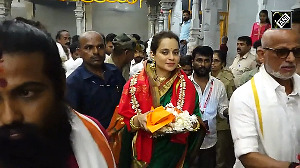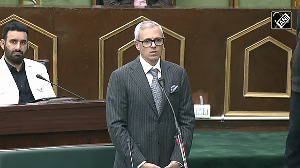Pakistan's cooperation in counter-terrorism efforts, US Assistant Secretary of State Christina Rocca has said, has been excellent since 9/11.
She said this while testifying before the US House of Representatives' Committee on International Relations, Subcommittee on Asia and the Pacific and International Terrorism, Nonproliferation and Human Rights in Washington.
In a prepared statement, Rocca said that the United States is working closer than ever with Pakistan to capture or destroy the remnants of Al Qaeda or the Taliban.
The US, she said, looks to Pakistan to do everything in its power to prevent extremist groups operating from its soil from crossing the Line of Control (into India). "The government of Pakistan has taken many steps to curb infiltration, but we are asking it to redouble its efforts."
The US "continues to monitor actions taken to curb such extremist groups as Lashkar-e-Tayiba, Jaish-e-Mohammed and others. These groups pose a serious threat to Pakistan, the region and the US."
"India is another close ally of the United States in the global war on terrorism and continues to support our efforts in this area. India is also a victim of terrorism, with a tragic attack on its Parliament on December 13, 2001 and a more recent bombing in Mumbai earlier this year that killed more than 50."
'The US has coordinated closely with Prime Minister (Atal Bihari) Vajpayee and the Indian government in helping them respond to these attacks'. Increasingly intensive Indo-US counter-terrorism cooperation "reflects the closer relations that the US seeks across the board with India."
She blamed both India and Pakistan for the impasse over the Kashmir issue. The US policy is to "encourage them to sit down and resolve their differences." She emphasised that the US is a close ally of both the countries.
However, lawmakers did not appear to be entirely convinced of Pakistan's sincerity.
Chairman of the Subcommittee on Asia and the Pacific, Republican congressman James A Leach, said: "It is self-evident that Pakistan is a vital linchpin in the campaign against terrorism. Nonetheless, many of us remain concerned that more needs to be done to ensure that Pakistani military and intelligence forces are fully committed to preventing jihadis from carrying out their grievous attacks in Afghanistan and Kashmir."
Democratic congressman Gary Ackerman, a former chairman of the India Caucus, said that the US economic support for Pakistan must be conditioned to it ending terrorism in Kashmir.
Democratic congressman Joseph Crawley, co-chairman of the India Caucus, said: "I do not view Pakistan as an ally in this war and believe that they are undermining our efforts to find Osama bin Laden and destroy his terrorist networks." The US should see to it that cross-border infiltration by separatist militants based in Pakistan, "who cross the LoC and who have been implicated in terrorist activities in India," ends.
Notably, the US state department's coordinator for counter-terrorism, Cofer Black, said, "Several Pakistani terrorist groups are suspected of using Pakistani territory as a base for their operations in and around Kashmir, poisoning relations between India and Pakistan."
Two panelists, Timothy D Hoyt, Associate Professor of Strategy and Policy at the US Naval War College, and B Raman, former head of counter-terrorism at India's Research and Analysis Wing, underlined the danger of terrorism emanating from Pakistan.
Raman said that Pakistan waxes eloquent on "self-determination" for Kashmir but does not want to talk about how it violated every condition laid down by the UN for a plebiscite, starting with refusal to evacuate captured territory and later giving away part of the State to the Chinese.






 © 2025
© 2025